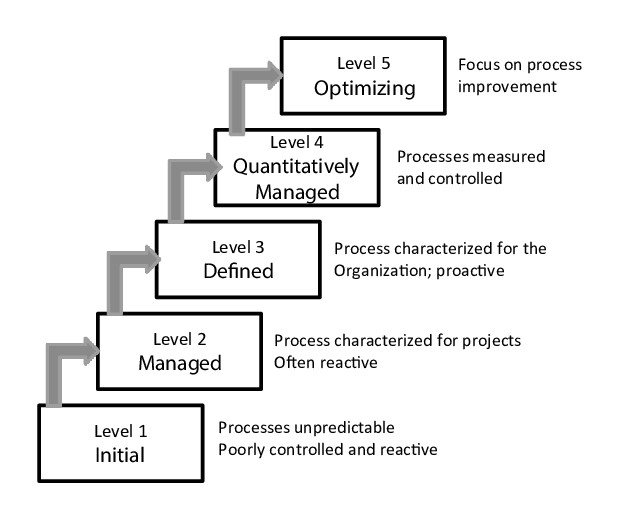The Capability Maturity Model Integration (CMMI) is a popular framework for evaluating or appraising where an organization’s maturity ranks within a defined program. The CMMI could show where an organizational program is ad-hoc and unorganized as compared to a highly structured and repeatable program. The CMMI was originally developed by the Software Engineering Institute, a cohort of government groups, and industry experts. The CMMI was originally designed to have an application towards software engineering but was quickly generalized to other areas of program appraisal. In January of 2013, the CMMI Institute was formed at Carnegie Mellon to continue the research and dissemination of the framework. Practitioners should take notice that the CMMI is not a standard and does not provide detailed information about achieving the goals being measured. The framework was more designed to serve as a guideline to understanding current implementations and alternative mechanisms to implement maturity levels in Continue reading
Project Management Concepts
Procurement Methods in Project Management
The development of procurement strategy follows the stages in the life of a project. Initially, a preliminary strategy is determined. It is based on a broad definition of objectives and is an essential step in establishing the way forward for the project. It encourages the client to consider strategy early. The preliminary procurement strategy is usually developed with help from the client’s adviser and possibly other consultants. Procurement strategy development has three components: Analysis – assessing and setting the priorities of the project objectives and requirements; Choice – considering possible options, evaluating them and selecting the most appropriate; and Implementation – putting the chosen strategy into effect. During strategy preparation, it may be necessary to seek specialist advice from other consultants, for example, in relation to expected costs for the project. The adviser should advise the client on this. Specialist advice should besought when developing the strategy for novel or Continue reading
Essential Skills for Project Managers
To be a good project manager, it is important to possess several skills in order to manage the project in the organization. Project managers need to have a wide variety of skills which can help them to do the best in project management. All the skills that possess by the project manager is determinant of the success of the project in project management. It is to fulfill the responsibilities as the project manager. There are several major knowledge and skill categories for project manager. Skills requirement of the project manager divided into four categories. Below are the four major knowledge and skills categories of the project manager. Project management process skills: Project Management process skills are the knowledge and skills related to the mechanism of project management. The project manager should be knowledgeable about tools, techniques and process technology in project management as well able to apply them in real Continue reading
Project Management Office (PMO)
Project Management Office (PMO) is continuously growing concept across the world. PMO is mainly responsible for the guidance, handling complex projects, documenting the overall progress of the projects and implementing the projects in the organization. The Project Management Office provides guidance in standardized tools, techniques and can reduce the problems caused by uncertainties in the project which also helps the project to be effective and cheaper. PMOs will also help in structuring project management into the systematic approach, like quality management, scheduling and conducting day-to-day tasks, iterations and do documenting the project. PMO can provide support to the project management process and in the selection of projects, contributing in the enhancement of maturity and to increase the performance of the organization in the project management. The Project management officer is the one who is in charge of the Project Management Office. He generally coordinates and supports the organization center. The Continue reading
Major Types of Risks in Project Management
Whenever a new projects starts, it start with risk and uncertainty levels which sometimes create deadlocks for project completion. Project risk management ensures if risks are evaluated and decreased as assessment carried, then it increased opportunities. This is for sure project management cannot eliminate all risk from the project but with good planning and statistics level of risk can be minimized, and which will acceptable for project making. Some of risk can be beyond the range of control which can affect the project length or budget, for that instance planning should carry out before those risk hit to project and prior to unwanted events occurring. Analysis and planning are the factor for key to success for project management. In the start of project major decision are carried out which impact on multiple stages for the project which base on incomplete information or inaccurate. To ensuring the best decision policy it Continue reading
Project Risk Management Process Steps
Project risk is an uncertain event or condition that, if it occurs, has a positive or a negative effect on at least one project objective, such as time, cost, scope, or quality (i.e., where the project time objective is to deliver in accordance with the agreed-upon schedule; where the project cost objective is to deliver within the agreed-upon cost; etc). A risk may have one or more causes and, if it occurs, one or more impacts. For example, a cause may be requiring an environmental permit to do work, or having limited personnel assigned to design the project. The risk event is that the permitting agency may take longer than planned to issue a permit, or the design personnel available and assigned may not be adequate for the activity. If either of these uncertain events occurs, there may be an impact on the project cost, schedule, or performance. Risk conditions Continue reading


